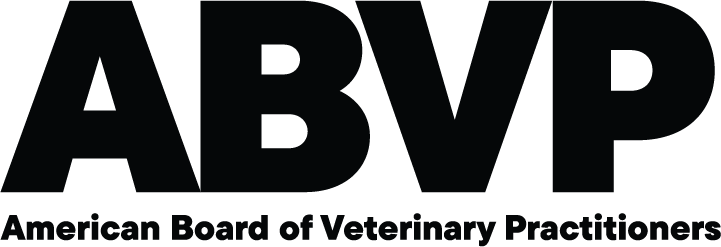Services
Services
- Home
- Services
What is ABVP?
ABVP Certification sets you apart – among the most ambitious, forward-thinking professionals in veterinary care, driven by a commitment to the wellbeing of animal and those who care for them. Certified veterinarians align themselves with the best practitioners in the field. The ABVP is an AVMA-recognized veterinary specialty organization™ for certification of its 12 Recognized Veterinary Specialties. The ABVP undergoes a comprehensive evaluation by the American Board of Veterinary Specialties (ABVS), a committee of the American Veterinary Medical Association, every three years to ensure that we are maintaining the required standards for our certification process. ABVP certifies veterinary practitioners with exceptional knowledge, skill, and competency in the care of the total patient.
ABVP Diplomates are certified in clinical practice for the species in which certification is granted. Clinical practice, as it pertains to veterinarians, is the art and science of applying medical knowledge to animals for their care and the alleviation and prevention of their diseases. The ABVP board certified veterinarian has demonstrated they are capable of providing a level of clinical practice that is clearly superior.
Certification takes dedication, adherence to high standards of practice and continuing education. Ultimately, it sets us apart among the most ambitious, forward-thinking professionals in veterinary care, driven by a commitment to the well-being of animals and those who care for them.
What We Do
Services
Below is a list of our services and some of the common questions we attempt to help you answer…
ABDOMINAL STUDY
What does that mass belong to? Is there a gastrointestinal foreign body? Why are these liver enzymes elevated? Does this pet have evidence of abdominal cancer?
THYROID/CERVICAL STUDY
Is this a thyroid tumor? Is this a sialocele or an abscess? Is this patient hypercalcemic due to primary hyper-parathyroidism or a paraneoplastic syndrome?
MUSCULOSKELETAL STUDY
What is the cause of this forelimb lameness? Does this dog have a partial cruciate tear? Is there a mass or an abscess in this swelling?
ECHOCARDIOGRAM
Can this pet undergo anesthesia? How severe is this pet’s heart disease? Can they wait to see the cardiologist or is it an urgent case?
THORACIC STUDY
Are those nodules cancer or fungal disease? Is this pneumonia or is there a tumor in that consolidated lung? What is causing the widening of the cranial mediastinum? Can we get a sample of the tissue/fluid to help make a more definitively diagnose?
TISSUE SAMPLING
Do we need tissue sampling in this case? Should we get an aspirate or a true-cut or a surgical biopsy? What about PARR and Flow-cytometry?
Canine & Feline Practice
The Canine and Feline Practice category is ABVP’s largest, with approximately 475 active Diplomates. Most are in private practice with a primary caseload of dogs and cats. Diplomates are expected to be skilled in the art and science of medicine and surgery as well as other areas such as preventative and wellness care, behavior, and public health. An increasing number of Canine and Feline Diplomates can be found in clinical service and teaching roles at veterinary colleges. Some serve in the military or work for pharmaceutical, nutrition, or biologics companies.
The typical veterinarians who pursue Canine and Feline certification work in high-quality practices and have access to the latest equipment, supplies, and medical/surgical procedures. They routinely see interesting, complex cases and are able to work them up and manage them at a high standard. While they may refer challenging cases to specialists, most Diplomates prefer to keep patients themselves. Specialists are used as resources but are not asked to take over all of the in-depth cases. Those who primarily work in emergency/critical care settings have also become Canine and Feline Diplomates.
Certification is challenging but rewarding. Veterinarians must have at least 5 years of full-time, high-quality practice experience with dogs and cats and be able to document a commitment to high-level continuing education. They also must be able to communicate professionally and scientifically by following instructions and preparing written case reports. To pass the comprehensive examination, candidates often spend an average of 1 hour per day studying, reading textbook and journal articles, and taking courses and practice tests. There are online study groups to help with credentials and examination preparation.

